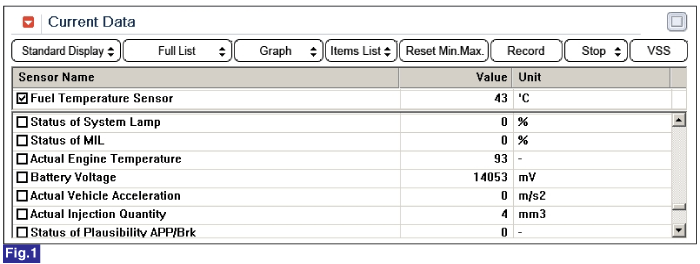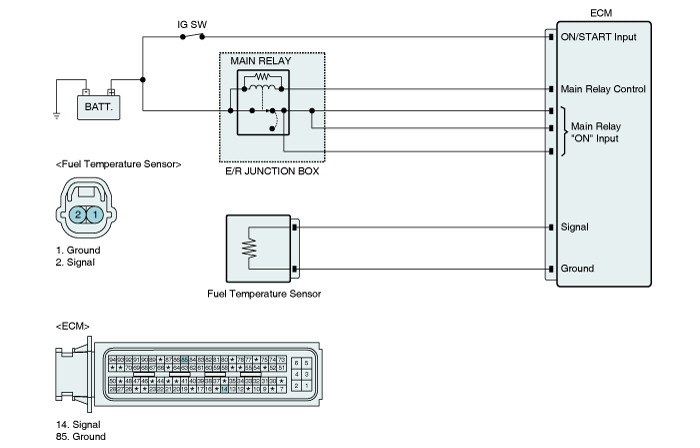Monitor "FUEL TEMPERATURE " parameter on the GDS.
Specification : Fuel temperature is displayed.

Fig.1) Check if too high or low temperature is displayed.(too high or low temperature is abnormal value.)

Fuel Temperature Sensor is NTC thermistor installed in fuel supplying line. It senses the temperature of fuel supplied to high pressure pump.
Fuel temperature is limited (engine power is limited) to keep fuel temperature from reaching at 120°C.
This limit is to protect fuel line such as high pressure pump and injectors from damages due to rapid deterioration by vapor-lock phenomenon which can occur at high temperature or destruction of oil membrane.
P0183 is set when the voltage above 4912mV - maximum voltage of FTS output - is detected for more than 2.0 sec.. This code is due to 1)open or short to battery in FTS signal circuit or 2)open in ground circuit.
Item | Detecting Condition | Possible Cause | ||
DTC Strategy | ● Voltage monitoring | ● FTS circuit ● FTS component | ||
Enable Conditions | ● IG KEY "ON" | |||
Threshold Value | ● When output signal is above the maximum value.(above 3204mV) | |||
Diagnostic Time | ● 2.0 sec. | |||
Fail Safe | Fuel cut | NO | ● FTS fixed at 80℃. | |
EGR Off | NO | |||
Fuel Limit | NO | |||
MIL | NO | |||
Temperature | - 30℃ | - 20℃ | -10℃ | 0℃ | 20℃ |
Resistance | 22.22~31.78㏀ | 13.24~18.10㏀ | 8.16~10.74㏀ | 5.18~6.60㏀ | 2.27~2.73㏀ |
Temperature | 40℃ | 50℃ | 60℃ | 70℃ | |
Resistance | 1.059~1.281㏀ | 0.748~0.904㏀ | 0.538~0.650㏀ | 0.392~0.476㏀ |

Connect GDS to Data Link Connector (DLC).
Warm engine up to normal operating temperature.
Turn "OFF" electrical devices and A/C.
Monitor "FUEL TEMPERATURE " parameter on the GDS.
Specification : Fuel temperature is displayed.

Fig.1) Check if too high or low temperature is displayed.(too high or low temperature is abnormal value.)
Electrical systems consist of a lot of harness and connectors, poor connection of terminals can cause various problems and damge of component.
Perform checking procedure as follows.
Check damage of harness and terminals : Check terminals for contact resistance, corrosion and deformation.
Check connecting condition of ECM and component connector : Check terminal seperation, damage of locking device and connecting condition between terminal and wiring.
Disconnect the pin which requires checking at male connector and insert it to the terminal at female connector for checking connecting condition. ( after checking, reconnect the pin at correct position. )
Is the problem found?
 | ▶ Repair the trouble causing part and go to "Verification of Vehicle Repair". |
 | ▶ Go to "Signal Circuit Inspection ". |
Check signal circuit voltage
IG KEY "OFF", ENGINE "OFF".
Disconnect FTS connector.
IG KEY "ON".
Measure the voltage between signal terminal of FTS harness connector and chassis ground.
Specification : 4.8V~5.1V
Is the measured voltage within the specification?
 | ▶ Go to "Ground Circuit Inspection". |
 | ▶ Go to "2.Check open in signal circuit" as follows. |
Check open in signal circuit
IG KEY "OFF", ENGINE "OFF".
Disconnect FTS connector and ECM connector.
Check continuity between signal terminal of FTS harness connector and ECM harness connector.
Specification : Continuity (below 1.0Ω)
Is the measured resistance within the specification?
 | ▶ Go to "3. Check short to battery in signal circuit" as follows. |
 | ▶ Repair open in signal circuit and go to "Verification of Vehicle Repair". |
Check short to battery in signal circuit
IG KEY "OFF", ENGINE "OFF".
Disconnect FTS connector and ECM connector.
IG KEY "ON".
Measure the voltage between signal terminalof FTS harness connector and chassis ground.
Specification : 0.0V~0.1V
Is abnormal voltage detected in the circuit with both connector is disconnected?
 | ▶ Repair short to battery and go to "Verification of Vehicle Repair". |
 | ▶ Go to "Ground Circuit Inspection". |
IG KEY "OFF", ENGINE "OFF".
Disconnect FTS connector and ECM connector.
IG KEY "ON".
Measure the voltage between signal terminal of FTS harness connector and chassis ground.[ TEST "A" ]
Measure the voltage between signal terminal and ground terminal of FTS harness connector. [ TEST "B" ]
( Signal terminal : Check + prove , Ground terminal : Check - prove )
Specification : [TEST "A"] Voltage - [TEST "B"] Voltage = below 200mV
Is the measured voltage within the specification?
 | ▶ Go to "Component Inspection". |
 | ▶ When "B" voltage is not detected : Repair open in ground circuit and go to "Verification of Vehicle Repair". ▶ When the voltage difference between "A" and "B" is above 200mV : Eliminate the causes of excessive resistance and go to "Verification of Vehicle Repair". |
IG KEY "OFF", ENGINE "OFF".
Disconnect FTS connector.
Measure resistance of signal terminal and ground terminal of FTS connector. (component side)
Specification : Refer to Specification of General Information.
Is the measured resistance at certain temperature within the specified resisance range at the temperature?
 | ▶ Go to "Verification of Vehicle Rapair". |
 | ▶ Replace FTS and go to "Verification of Vehicle Rapair". |
After a repair, it is essential to verify that the fault is corrected.
After connecting GDS select "Diagnostic Trouble Codes(DTCs)" mode to and then clear DTC.
Drive the vehicle within DTC Enable conditions in General information.
After selecting "Diagnostic Trouble Codes(DTCs)" mode and check DTC is recorded again.
Are any DTCs recorded ?
 | ▶ Go to the DTC guide of recorded NO. in GDS. |
 | ▶ System operates within specification. |